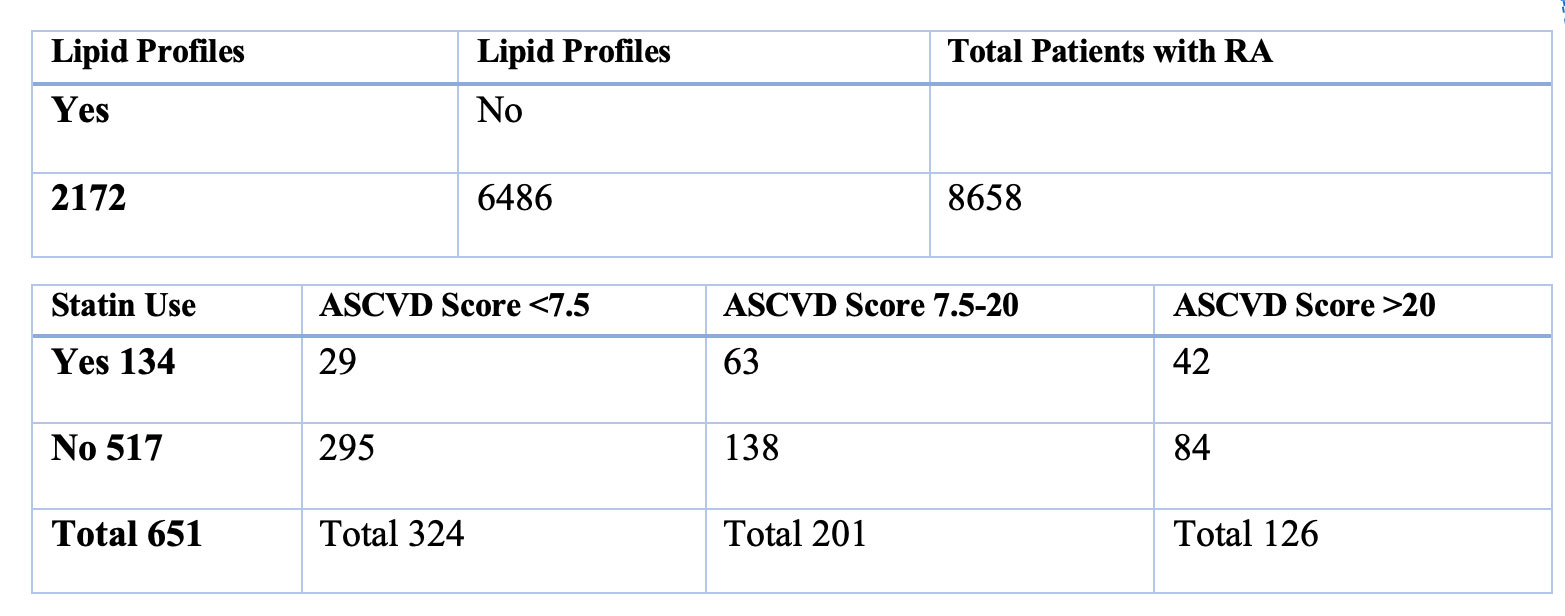Session Information
Session Type: Poster Session C
Session Time: 1:00PM-3:00PM
Background/Purpose: Rheumatoid arthritis (RA) is a chronic inflammatory disease. Patients with RA are at risk of accelerated cardiovascular disease (CVD). The purpose of this study was to determine whether patients with RA were appropriately being screened for CVD risk and whether they were adequately treated with lipid lowering agents. The European League Against Rheumatism (EULAR) recommends CVD risk screening once every 5 years in patients with RA. Currently there are no definite guidelines from American College of Rheumatology (ACR).
Methods: Electronic medical records (EMR) of patients with a diagnosis of RA were reviewed from years 2016-2021. Data were obtained on concomitant cardiovascular risk factors including tobacco use, hypertension, diabetes, chronic kidney disease and diagnosis of primary cardiovascular disease. Atherosclerotic Cardiovascular Disease (ASCVD) risk scores were calculated for all the patients between the ages of 40-75 who had the required data available in their charts including blood pressure measurements, use of antihypertensive therapy, lipid profile and smoking status.
Results: EMR of 8658 patients were reviewed. Only 2172 had a lipid profile within last 3 years. ASCVD scores were calculated for 651 patients. Out of these, 327 ( >50%) had an ASCVD score > 7.5 %. Out of these 327, only 105 were on a statin. 38.5 % of the patients had an elevated ASCVD score >20%. The statin use was increased with ASCVD scores between 7.5% and 20% over those with scores < 7.5 % (p=0.00001; Table 1). Surprisingly, statin use was not increased in patients with ASCVD scores > 20% over those with scores between 7.5% and 20% (Table 1). Additionally, our analysis revealed that concomitant risk factor for cardiovascular disease were common in patients with RA. Hypertension was the most common CVD risk factor in our RA cohort (48.7%; Figure 1).
Conclusion: We identified that majority of RA patients have concomitant cardiovascular risk factors, hypertension being the most prevalent one, followed by diabetes mellitus and chronic kidney disease. More than half of our cohort had an elevated ASCVD score. The findings suggest that risk stratification for CVD with lipid profiles and ASCVD scores is underutilized and statin use is suboptimal in this RA population despite having an accelerated risk of cardiovascular disease. We propose an EMR alert to obtain lipid profiles for risk stratification and to consider statin use in RA patients with ASCVD scores > 7.5.
ASCVD < 7.5 vs >20: < 0.00001,
ASCVD > 20 vs 7.5_20: 0.707584
Table 1. Rheumatoid Arthritis patients with lipid profiles. ASCVD scores and statin use in 651 patients who had data available for calculation
To cite this abstract in AMA style:
Munawar T, Khokhar F, Perl A. Inadequate Cardiovascular Disease Risk Screening and Preventative Treatment in Patients with Rheumatoid Arthritis [abstract]. Arthritis Rheumatol. 2022; 74 (suppl 9). https://acrabstracts.org/abstract/inadequate-cardiovascular-disease-risk-screening-and-preventative-treatment-in-patients-with-rheumatoid-arthritis/. Accessed .« Back to ACR Convergence 2022
ACR Meeting Abstracts - https://acrabstracts.org/abstract/inadequate-cardiovascular-disease-risk-screening-and-preventative-treatment-in-patients-with-rheumatoid-arthritis/


